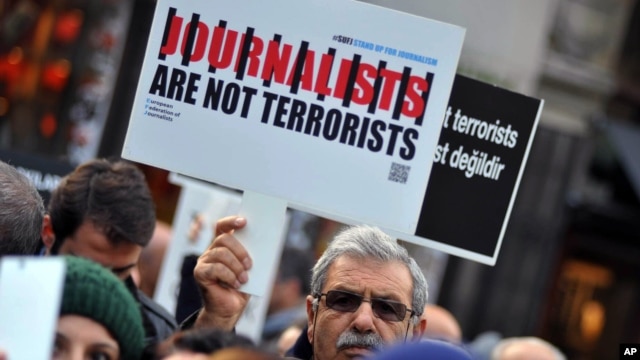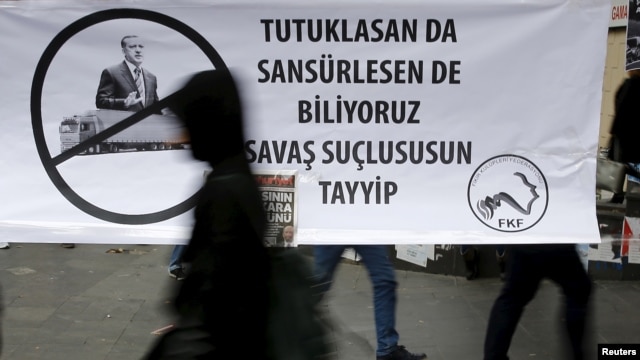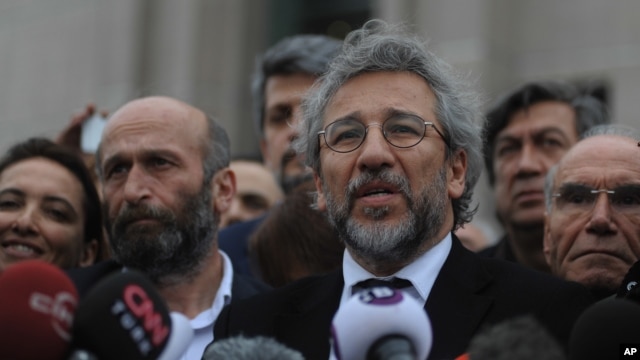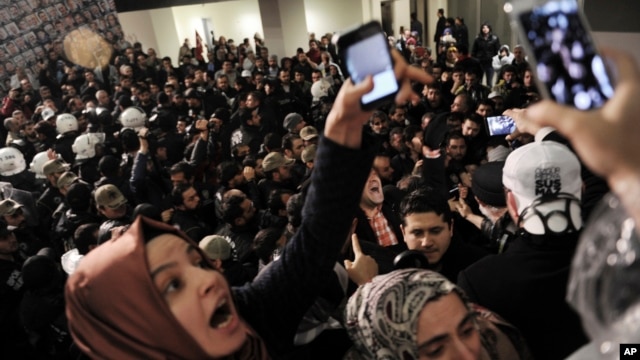Turkish Government Targeting Foreign Media, Journalists Say
News / Europe
Turkish Government Targeting Foreign Media, Journalists Say
FILE - Turkish journalists are seen gathered to protest the jailing of opposition Cumhuriyet newspaper's editor-in-chief Can Dundar and Ankara representative Erdem Gul, in Istanbul, Dec. 26, 2015.
March 30, 2016 2:38 PM
Foreign journalists working in Turkey complain the government of President Recep Tayyip Erdogan has started to target them in an expansion of a media clampdown that until recently appeared mainly focused on domestic newspapers and broadcasters.
They say there has been an alarming rise in police harassment - from persistent and aggressive identity and accreditation checks in towns along the border with Syria and in the country’s mainly Kurdish southeast, to demands to inspect cell phones and laptops owned by foreign journalists arriving at airports from overseas.
Two Western reporters have been arrested in recent weeks at Istanbul airports and then summarily deported hours later - one, Spanish photojournalist Natalia Sancha, after refusing to provide passwords to unlock her computer and cell phone, which would have allowed data trawling.
More than half a dozen others, including Sam Tarling, a Beirut-based freelance news photographer who works mainly for London’s Daily Telegraph, have confirmed they were given no alternative but to divulge their phone and laptop passwords, if they wanted to continue with onward travel.
And several foreign journalists based in Turkey in the past few months have either been expelled or have been withdrawn by their employers from the country after authorities declined to renew press accreditation. On March 17, Hasnain Kazim, the German weekly Der Spiegel’s Turkey correspondent, was forced to leave after Turkish authorities refused to renew his press credentials.
And several foreign journalists based in Turkey in the past few months have either been expelled or have been withdrawn by their employers from the country after authorities declined to renew press accreditation. On March 17, Hasnain Kazim, the German weekly Der Spiegel’s Turkey correspondent, was forced to leave after Turkish authorities refused to renew his press credentials.
Eight of the 20 German journalists based in Turkey have also been refused press cards, according to media watchdogs.
The deportations and accreditation denials appear to have increased since last September, when Dutch journalist Frederike Geerdink was expelled after she was detained on allegations of aiding Kurdish militants while reporting in the country’s strife-torn southeast.
FILE - A woman walks past a banner picturing Turkish President Recep Tayyip Erdogan that reads, "When you arrest (journalists) or censor (media) we know that you are a war criminal, Tayyip," during a protest in Ankara, Turkey, Nov. 27, 2015.
Campaign of intimidation alleged
The ramping up of what foreign reporters describe as a campaign of intimidation against them comes as Western governments and Ankara clash over the trial of two Turkish journalists, which started last week. Turkish officials, including President Erdogan himself, have lashed out at EU countries for tasking diplomats to attend the first hearing of the controversial trial of the two prominent journalists, Can Dundar and Erdum Gul, who are charged with spying and threatening state security.
EU governments have expressed alarm at what they see as a concerted effort by the Erdogan government to control journalism in the country, what is being reported and where journalists go. Most of the criticism has focused on cases brought against Turkish media outlets or the seizing of control by the government of newspapers and broadcasters critical of the policies being pursued by Ankara.
But the increasing targeting of foreign reporters is adding to alarm, said a senior diplomat based in Istanbul. “In January, Prime Minister Ahmet Davutoglu dismissed our criticism of how the government is handling the media, saying, ‘If there is anything limiting freedom of expression in Turkey, I will be the first one to resist it.’ Well, he hasn’t put up much of a resistance,” said the diplomat.
The growing list of incidents at Istanbul airports involving foreign reporters has prompted complaints from several EU countries, including Denmark.
FILE - Can Dundar, the editor-in-chief of opposition newspaper Cumhuriyet, right, and Erdem Gul, left, the paper's Ankara representative, speak to the media after the opening of their trial in Istanbul, March 25, 2016.
‘Very disturbing’
On February 9, Claus Blok Thomsen, a Copenhagen-based foreign reporter for Denmark’s leading daily broadsheet newspaper, Politiken, was detained at Istanbul's Sabiha Gokcen International Airport, where he was changing planes to travel to the border town of Kilis.
“It was very weird,” said Thomsen. It was his first visit to Turkey in many years. “At passport control I was surrounded by three plains-clothes security guys and I showed them my passport. I was taken to a small room near passport control. They asked me to open my iPhone and laptop. They asked for my passwords so they were able to see what I had on my phone and computer and that is very disturbing. They didn’t give me a choice. I was surrounded by security guys, so I did what I was told to do. It wasn’t a two-way discussion. They took them and disappeared for a long time,” he said.
He added: “Eventually I asked what was going on and I was told that I would not be allowed to continue to travel. They said they were just following orders from their superiors and I was told I was considered a threat to national security.” He was held in a cell overnight and then put on a plane back to Copenhagen. “I had not as such written about Turkey before, except I had been covering al-Qaida facilitators in Denmark who had been assisting Danish jihadists to travel through Turkey to Syria,” he said.
“[That] makes it even weirder that they picked me; they didn’t interrogate me, they didn’t ask me one question,” Thomsen told VOA. His newspaper has asked for more explanation as has the Danish Foreign Ministry and the country’s prime minister, Lars Lokke Rasmussen, but so far to no avail.
FILE - Journalists react as riot police enter the headquarters of Turkey's largest-circulation newspaper Zaman in Istanbul, March 4, 2016.
‘They put me in a room and searched everything’
Beirut-based Spanish photo-journalist Natalia Sancha, who works mainly for Spain’s El Pais newspaper, suspects her confrontation at Sabiha Gokcen International Airport was the result of her coverage on previous trips. One of her reports on the experiences of Syrian refugees trying to travel from Turkey to Europe explored allegations of collaboration between organized crime smuggling gangs and Turkish policemen.
“On my arrival two security guys stopped me when I was on my way to catch a domestic flight,” she told VOA. “They put me in a room and searched everything - I had a camera, computer and books. And then at the end they told me to hand over my phone, they wanted to go over it. With some countries I remove contacts from my phone before I travel. But I never thought that I would need to clean out my phone when it comes to Turkey,” she added.
Sancha was warned if she didn’t provide her passwords, she would be jailed but she continued to refuse to do so and demanded to see a Spanish consular official. “I told them if the embassy told me to provide the phone and password, I would do so, but they made it clear they couldn’t care less about Spain.” She said she got into a shoving match with two women security officers who were very aggressive with her.
After spending 16 hours in a windowless cell without food or water, Sancha was deported on the grounds of being a threat to Turkish national security and has been banned for five years from entering the country. One official confided to her she had been put on a list of journalists to be targeted because of her work.
VOA asked for comment from the Turkish Foreign Ministry about incidents at Istanbul airports involving journalists as well as the refusal to renew the press accreditation of others but received no response by the time this article was published.
Said Politiken reporter Thomsen, “It seems like there is no logic why some people are detained and others are not. Turkey says it wants to become a member of the EU, but this is not the way a member of the EU should act.”





Comments